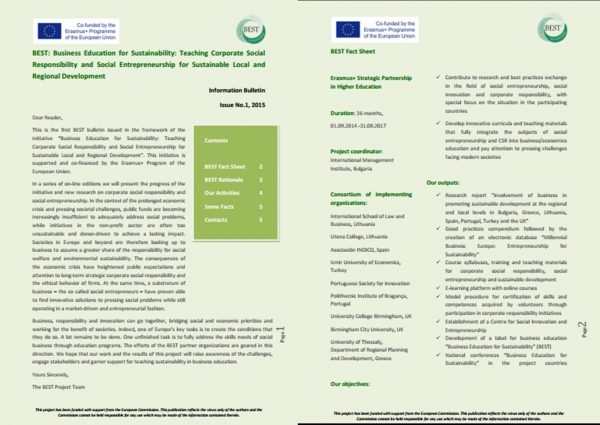Mordoğan Vocational Training Center, 2005-2006
Vocational Training Actions to Combat Poverty and Promote Sustainable Development in the Municipality of Mordogan
The Institute of Urban Environment and Human Resources, Panteion University, in co-operation with the Foundation for Development, Ege University and the Municipality of Mordogan, intends to implement a local pilot project of vocational training, in an attempt to help contribute to the eradication of poverty in the Municipality of Mordogan, Karaburun Province, Turkey. Financed by the Hellenic Ministry of Foreign Affairs and planned and implemented in accordance with the guidelines of the OECD Development Assistance Committee and the UN Millennium Development Goals and Targets, the project seeks to combat poverty and support low-income population through the creation of structures of vocational training in the Municipality of Mordogan, Izmir, Turkey. Despite its significant development potential, relatively low economic indicators and particularly high unemployment rates characterize the Municipality of Mordogan. The project aims at the establishment of a vocational training centre that will act as an important innovative structure to promote local sustainable development and combat poverty and unemployment. In the first place, the vocational training centre will develop a local strategy for training schemes and will realize a pilot training programme for designers seeking to better acquaint them with the peculiarities of the locality and its unexploited development potential. In the second place, it will provide the necessary support and organize pilot vocational training seminars to combat poverty and unemployment while also contributing to the wider sustainable economic growth of the district and its residents.
Target Groups
Special focus will be given to the target groups of women and young persons, the two groups that are most hardly hit by unemployment. Preliminary socio-economic studies of the region have indicated the high development potential of the region in sectors such as fisheries, olive oil production, embroidery and tourism and the existence of a considerably unskilled but educated labour force. It is the aim of the project to provide the local labour force with the required skills that will boost the local economy and facilitate the sustainable development of the region.
Actions
The project intends to realize the following broader actions:
- Action I: The establishment of a vocational training centre in the municipality of Mordogan that could accommodate the educational services of training.
- Action II: The preparation of an in-depth socio-economic study to analyse the local needs and development potential and design the socio-economic profile of the district and its labour force.
- Action III: The elaboration of a Manual and Tool for designing training programmes and the realization of a pilot seminar to local designers.
- Action IV: The planning and implementation of pilot seminars of vocational support and training for local women and young unemployed persons in selected sectors to increase employment opportunities in the wider region.
- Action V: The wider dissemination of information to the local population, as well as of project’s results abroad.
Sustainability - Viability
The project’s sustainability – viability constitutes the main priority of the project. Towards that goal, the project does not only seek to train the local labour force and provide the region with the necessary training infrastructure. It goes a step further by providing the ‘designing vocational training programmes’ know-how to secure the viability of the whole attempt upon the project’s completion. Viability also demands greater participation and legitimacy. The provision of constant support for the regular operation of the centre by the Municipality of Mordogan and the academic community of the area during the first three years will constitute a significant guarantee for the project’s sustainability. The efficient and regular operation of the centre during this period, the active involvement of regional key stakeholders, the provision of assistance to the local population and the realization of seminars in the fields of embroidery, fisheries, agriculture and tourism that will subsequently improve the employment opportunities in the region, will no doubt create a solid basis for the economic viability of the centre in the future. A specially created local TASK FORCE, responsible for the everyday management and operation of the centre, will also contribute to the viability of the centre upon the project’s completion.
Duration
Eight months: October 2003 – May 2004
Participants
UEHR, Panteion University: Professor P. Getimis, Dr L. Demetropoulou
Foundation for Development, EGE University: , Assoc. Professor N. Kumral, Assoc. Professor R. F. Barbaros, Assist. Professor M. Ogut Uzbay
Izmir University of Economics: Professor E. Ada
NEWSALL NEWS

The first bulletin of the BEST Project has been published
Thefirst bulletin of the BEST project which has been pursued by EKOKENT has been published. The bulletin is available as an ...

Welcome to the SOCIAL MARKETING course for the HEI Group.
This course is part of the iSIMPLY project. https://www.isimply.eu iSIMPLY is an innovative project aiming to investigate how social media interaction ...

...


